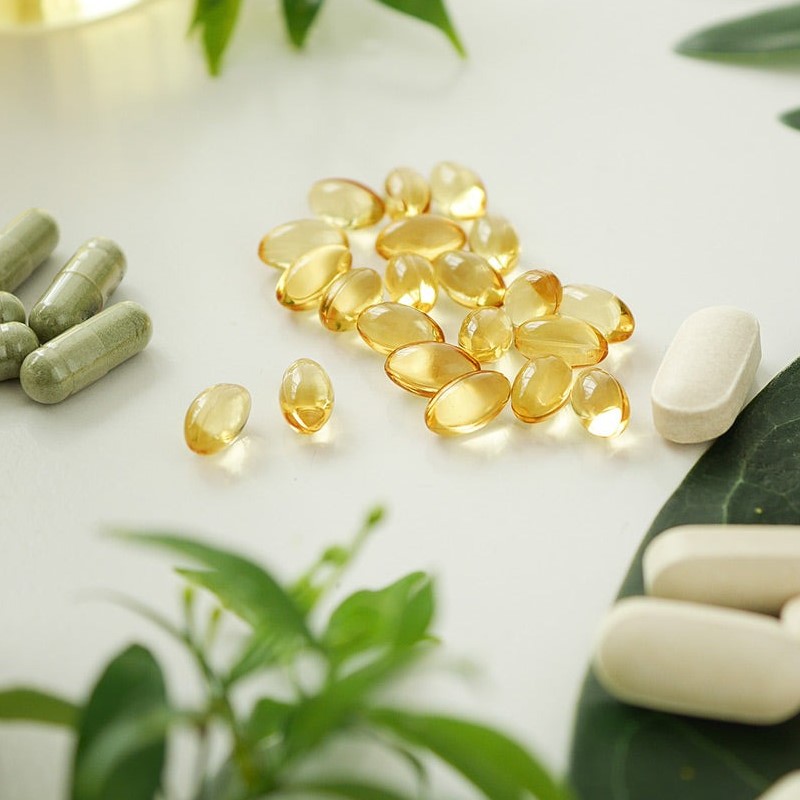
The Role of Vitamins in Energy Metabolism
Vitamins are key in converting food into energy. Our cells use this energy to function. Without enough vitamins, we feel tired and sluggish. Every vitamin has a unique role in energy metabolism. The best vitamins for energy help enzymes work properly. They allow the body to process carbohydrates, fats, and proteins. B-complex vitamins are especially important for energy. These vitamins work together to help our bodies make ATP. ATP is the primary energy carrier in cells. A good balance of vitamins ensures the smooth flow of metabolism. This balance leads to better energy levels throughout the day. To boost energy, we need to get the right vitamins from our diet or supplements.
Top Vitamins for Enhancing Energy
To elevate energy levels, it’s crucial to know the best vitamins for energy. These vitamins not only support metabolism but also combat fatigue and boost vitality. Including them in your diet can make a noticeable difference.
B-Complex Vitamins: Powerhouse for Energy
B-complex vitamins stand out when it comes to energy. They work as a team to convert food into fuel. This group includes B1 (thiamine), B2 (riboflavin), B3 (niacin), and others up to B12. Each one has a special role in energy production. For instance, B12 supports red blood cell formation. This helps carry oxygen to your cells, boosting energy.
For the best results, include B-complex-rich foods in your diet. Think whole grains, meat, eggs, and nuts. These foods can keep your energy at an optimal level throughout the day.
Vitamin D: The Sunshine Vitamin for Fighting Fatigue
Vitamin D is essential for more than just strong bones. It can combat fatigue and increase energy. Many of us do not get enough of this vitamin, especially in winter. The sun is a natural source, but food sources are also important. Fatty fish, egg yolks, and fortified foods are all good for vitamin D intake. Consider a supplement if you don’t get enough sunlight or dietary vitamin D.
Vitamin C: Antioxidant and Immune Booster
Vitamin C does more than support your immune system. As a powerful antioxidant, it helps fend off oxidative stress in your body. This stress can lead to fatigue. Vitamin C also helps in the production of L-carnitine. This nutrient carries fatty acids into the cells for energy. To ramp up your vitamin C intake, eat plenty of citrus fruits, strawberries, bell peppers, and kiwi.
How to Naturally Incorporate Energy-Boosting Vitamins in Your Diet

A well-rounded diet filled with nutrient-dense foods is the best way to get the vitamins you need for energy. Incorporating the best vitamins for energy naturally into your diet can be simple and delicious. Here are ways to ensure you’re getting enough of these vital nutrients.
Dietary Sources of B Vitamins
B vitamins are abundant in many foods, and including a variety of these in your meals can boost your energy levels. Aim to eat more whole grains, such as brown rice and oatmeal, which contain B1 and B6. Lean meats and liver are excellent for B12, while leafy greens like spinach offer B9 (folate). Don’t forget legumes and nuts as they are B-complex powerhouses, too.
Foods Rich in Vitamin D
Vitamin D can be a bit trickier to obtain from food, but it’s not impossible. Fatty fish like salmon, trout, and mackerel are among the best sources. Egg yolks and fortified foods such as milk, orange juice, and cereals also contribute to Vitamin D intake. Whenever possible, get some sunshine as it facilitates Vitamin D production in your skin.
Fruits and Vegetables High in Vitamin C
Vitamin C is readily available in a wide range of fruits and vegetables. Oranges, kiwis, and strawberries are delicious and packed with this energy-boosting vitamin. Vegetables like bell peppers, broccoli, and Brussels sprouts also have high Vitamin C content. Incorporate these foods into your meals for a refreshing and energizing diet.
Understanding the Signs of Vitamin Deficiency
Knowing the signs of vitamin deficiency is key for maintaining energy. If you lack vitamins, your body will tell you. Watch for these signs:
- Tiredness and fatigue: Even with ample sleep, you might feel constantly tired.
- Weakness: You may experience muscle weakness or a general feeling of being physically weak.
- Mood changes: Look out for unexplained mood swings or feeling down.
- Poor concentration: Trouble focusing or remembering things can be a signal.
To aid energy levels, it’s crucial to spot these signs early. This way, you can adjust your diet or look into supplements. Remember, the best vitamins for energy are key to vitality. If you suspect a deficiency, consider seeing a healthcare professional for advice.
The Importance of Vitamin Supplementation for Energy

While a balanced diet is the foundation of good health, sometimes it may not be enough to meet our energy needs. This is where vitamin supplementation can play a crucial role. Supplements can help fill the nutritional gaps and ensure that we get the necessary daily intake of the best vitamins for energy.
For those with dietary restrictions or certain health conditions, supplements can be especially important. They provide a consistent source of vitamins that might be difficult to consume in adequate amounts through food alone.
Choosing to supplement your diet with vitamins can lead to improved energy levels and a better overall sense of wellbeing. However, it is vital to select the right supplements and use them responsibly to achieve the desired benefits.
Choosing the Right Vitamin Supplements
To make the most of vitamin supplements for energy, it is essential to pick the right ones. Look for supplements that include the B-complex vitamins as they are directly involved in energy production. Vitamin D and Vitamin C should also be considered, as they play a role in reducing fatigue and boosting immunity.
Always check the label for the recommended daily allowance (RDA) to avoid excessive intake. If you are unsure about what supplements to take, consult a healthcare professional for personalized advice.
The Pros and Cons of Synthetic vs. Whole Food Supplements
There is a debate on whether synthetic or whole food supplements are better. Synthetic supplements are made in a lab and tend to be more affordable. They are also designed to be easily absorbed by the body. However, some believe that they might not be as beneficial as whole food supplements because they lack the additional compounds found in natural sources.
Whole food supplements, on the other hand, are derived from concentrated, dehydrated whole foods. They often contain a wider range of vitamins and trace minerals that can work together synergistically. But these supplements might come at a higher cost and may require larger doses to achieve the same vitamin concentration as synthetic ones.
When it comes to choosing between them, consider your budget, preference, and any dietary restrictions. No matter which type you choose, ensure you opt for high-quality supplements from reputable sources.
The Impact of Lifestyle on Vitamin Absorption and Energy Levels

Adopting healthy lifestyle habits is crucial for vitamin absorption and maintaining high energy levels. Here we explore how lifestyle choices can influence your vitamin intake and overall vitality.
Exercise and Vitamin Absorption
Regular physical activity can boost your body’s ability to absorb and use vitamins effectively. Exercise increases blood flow, helping to transport nutrients throughout your body. Engage in activities like brisk walking, cycling, or swimming to enhance vitamin absorption and improve energy.
Sleep’s Role in Vitamin Utilization
Adequate sleep is essential for the body to repair and utilize vitamins. Lack of sleep can disrupt the metabolic process and lead to lower energy levels. Aim for 7 to 9 hours of sleep per night to help your body’s vitamin utilization.
Stress and Nutrient Absorption
Stress can negatively impact how your body absorbs and uses vitamins. It can interfere with digestive functions, reducing nutrient uptake. Manage stress through techniques like meditation, yoga, or deep breathing to help maintain optimal vitamin absorption.
Alcohol and Vitamin Depletion
Consuming too much alcohol can deplete essential vitamins, particularly B-complex vitamins. It can impair nutrient absorption and exacerbate fatigue. Limit alcohol intake to help your body keep the vital nutrients it needs to stay energized.
Smoking and Oxidative Stress
Smoking introduces toxins that can increase oxidative stress and deplete vitamin C. This can affect energy levels. Quitting smoking can help protect your vitamins and maintain better energy throughout the day.
Adopting a lifestyle that supports vitamin absorption is key. Engaging in regular exercise, ensuring adequate sleep, managing stress, limiting alcohol, and avoiding smoking can all contribute to better energy levels and vitality. Choose habits that work for your life and watch your energy soar.
Combining Vitamins with Other Nutrients for Maximum Energy
To achieve maximum energy, it’s not just about the best vitamins for energy. We must also consider other nutrients. These work with vitamins to enhance overall vitality. Here’s how to effectively combine them:
- Proteins: They’re the building blocks of life. Pairing protein with B vitamins boosts their ability to produce energy.
- Iron: Iron helps carry oxygen to cells, crucial for energy. Vitamin C aids in iron absorption, so consume them together.
- Omega-3 Fatty Acids: These healthy fats promote heart health. A strong heart supports better energy distribution.
- Magnesium: This mineral is needed for hundreds of enzyme reactions, including those that generate energy. B-vitamins work alongside magnesium to amplify energy release.
- Electrolytes: Minerals like potassium and sodium are vital for nerve function and energy delivery in your body. Stay hydrated and balanced.
- Water: It may not be a nutrient, but water is essential. Even mild dehydration can cause fatigue.
Incorporate a mix of these nutrients in your meals. For instance, choose leafy greens (rich in iron and magnesium), fatty fish (high in B-complex vitamins and omega-3), and nuts (packed with electrolytes). Remember, a colorful plate often signifies a nutrient-rich meal. Drink plenty of water throughout the day to help these nutrients work effectively.
Choosing whole foods, when possible, can provide a broad range of nutrients. This natural synergy promotes better health and energy levels. If you’re considering supplements, select ones that contain a blend of these crucial elements. Actively combining vitamins with other nutrients ensures that your body receives all it needs for sustained vitality and energy.





